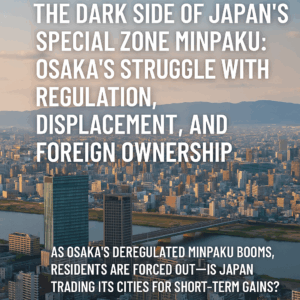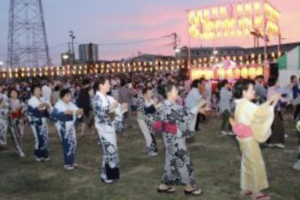
As Osaka’s Deregulated Minpaku Booms, Residents Are Forced Out—Is Japan Trading Its Cities for Short-Term Gains?
Introduction
Japan’s post-COVID tourism recovery has been dramatic. With a record 36.87 million foreign visitors in 2024 and a national goal of 60 million by 2030, the demand for lodging has skyrocketed. To meet that demand, Japan introduced Special Zone Minpaku—a deregulated short-term rental scheme allowed only in government-designated areas.
But as the number of these properties explodes—particularly in Osaka, where over 90% of Special Zone Minpaku facilities are concentrated—so do the complaints, legal concerns, and social frictions. What began as a creative hospitality solution is now raising urgent questions about housing stability, governance, and even immigration abuse.
What Is “Special Zone Minpaku”?
Special Zone Minpaku is a deregulated category of short-term rental housing permitted only in National Strategic Special Zones such as Osaka, Ota Ward (Tokyo), and Kitakyushu.
Unlike standard Minpaku (limited to 180 operating days per year), Special Zone Minpaku allows:
-
Year-round operation (365 days)
-
No front desk or on-site staff
-
No cap on building scale or unit count
-
Simplified application process
In practice, this has enabled the development of hotel-like operations without the corresponding legal safeguards. In June 2025, for example, a 14-story, 212-unit tower in Osaka’s Konohana Ward opened as a full-time Minpaku facility with hot springs and multilingual marketing targeting foreign tourists.

Foreign Ownership and the Visa Loophole
Beneath the surface lies another dimension: foreign ownership, especially by investors from mainland China. Many properties are purchased through shell companies or local intermediaries, allowing non-residents to control residential buildings and operate them as commercial lodging.
Even more concerning is the apparent misuse of Japan’s Business Manager Visa—a residency status designed for genuine entrepreneurs. Legal and immigration professionals have raised red flags over individuals setting up nominal Minpaku businesses with no real economic activity, solely to obtain long-term visas.
This has turned deregulated housing into a pathway not just for tourism profits, but for residency-by-loophole—outside the scrutiny of both immigration and housing regulators.
Community Backlash and Displacement
The social consequences are now visible in neighborhoods across Osaka. Between 2021 and 2024, complaints surged fivefold. In Nishinari Ward and others, residents report garbage dumping, late-night partying, and constant turnover of guests.
A local resident noted:
“You try to warn them, but they’re gone the next day. It’s endless.”
But the most shocking development came in May 2025, when tenants of a condominium in Osaka’s Minato Ward were handed eviction notices. The letter read:
“The building will be used solely for Minpaku purposes.”
This mass eviction was not illegal—but it exposed the system’s fundamental flaw: residential buildings can be converted into de facto hotels, pushing out long-term Japanese residents to make way for tourists.
Enforcement Gaps and Policy Failure
Despite 556 complaints in Osaka in 2024 alone, local governments have limited power to act. In Tokyo’s Ota Ward, officials say they cannot trace who stays where, who owns what, or who is truly accountable.
-
Platforms obscure booking details
-
Properties are owned by offshore entities
-
Guests use aliases
→ Accountability is nearly zero.
The result is an unregulated parallel hospitality economy—right inside residential neighborhoods.
Economic Boom vs. Social Cost
There is no doubt that Minpaku fills a market gap and delivers returns.
-
Higher yields than traditional rental
-
Lower costs than hotels
-
Faster recovery post-COVID
But tourism growth cannot justify the erosion of housing rights, neighborhood integrity, and visa compliance.
As Dr. Ryo Nishikawa of Rikkyo University warns:
“Minpaku will continue to grow unless better zoning is introduced. We must separate tourism zones from residential districts to prevent social conflict.”
Time for Reform?
Osaka Mayor Hideyuki Yokoyama has acknowledged the crisis and is considering a temporary halt to new Minpaku approvals. A cross-agency taskforce has been launched to reassess the framework.
Experts are calling for urgent action:
-
Introduce zoning rules that ban Minpaku in residential-only districts
-
Create ownership disclosure requirements for transparency
-
Enforce visa compliance checks for Business Manager applicants
-
Set up community protection measures against eviction-driven conversion
The question is no longer “Can we house the tourists?”
It is: “How do we protect the people who already live here?”
Conclusion
Special Zone Minpaku began as an innovative hospitality concept. But today, it risks becoming a tool for speculative acquisition, immigration exploitation, and housing displacement.
If Japan fails to act, it may end up trading its long-term community health for short-term economic gain.
Now is the time for reform—not just to manage tourism, but to defend the urban fabric that makes Japan livable in the first place.
Are you exploring real estate investment opportunities in Tokyo’s ultra-prime market? Or seeking strategic insight into Japan’s unique property regulations and investor landscape?
At Yamamoto Property Advisory, we specialize in assisting international investors, family offices, and institutional clients with:
-
Sourcing and evaluating high-end residential and investment-grade assets in central Tokyo
-
Navigating Japan’s real estate legal framework and transaction practices
-
Managing cross-border compliance, tax structuring, and ownership strategies
-
Coordinating with developers, brokers, and legal professionals in both English and Japanese
Whether you are acquiring a trophy penthouse or building a long-term Japan portfolio, we provide independent, bilingual guidance tailored to your goals.
Contact us or Email: yamamoto@yamamoto-property.jp
#JapanRealEstate
#OsakaPropertyMarket
#ForeignOwnership
#ResidentialDisplacement
#RealEstateEthics
#SustainableTourism
#TourismVsCommunity
#ShortTermRentalCrisis
#LocalVoicesJapan
Source : Nikkei article

Toshihiko Yamamoto is the founder and principal broker of Yamamoto Property Advisory, a distinguished real estate brokerage in Tokyo that specializes in luxury residential and investment properties for an international clientele. His firm caters to discerning investors seeking premier properties for personal use and income-generating whole buildings for investment purposes.A licensed realestate broker in Japan, Mr. Yamamotoholds an MBA from Bond University in Australiaand a Certified Commercial Investment Member (CCIM) designation from the CCIM Institute in the United States. His extensive international experience, having lived abroad in Australia and the United Kingdom, equips him with a nuanced understanding of global real estate trends and the unique needs of foreign investors.With over two decades of experience in international business, Mr. Yamamoto has successfully conducted business with clients from more than 20 countries. As a seasoned property investor himself, he provides informed guidance to his clients as they navigate the intricacies of the Japanese real estate market to secure optimal investments.Discover more in his book, “The Savvy Foreign Investor’s Guide to Japanese Properties: How to Expertly Buy, Manage, and Sell Real Estate in Japan,” available on Amazon, iBooks, and Google Play.Connect with us through social media on Instagram, WhatsApp, and LINE for further information and expert assistance.



About the book
Amazon.com Link




